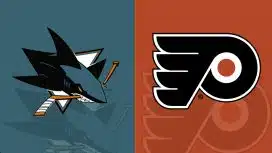By Kevin Durso, Sports Talk Philly editor
When it comes to tough guys and the overall toughness of hockey players, you could say it takes one to know one. When asked why Michal Neuvirth remained in the game through the end of the first period on Saturday when he suffered an injury with roughly five minutes left in the period, Flyers GM Ron Hextall didn't hesitate with his response.
"Hockey players are tough."
The Flyers GM would know. While goaltenders aren't normally associated with the physical presence on the ice, Hextall was just one of many over the 50 years the Flyers have been in existence that have embodied the meaning of the term "tough guy."
The Flyers will pay tribute to the tough guys with their second Heritage Night prior to Thursday's game.
To understand the meaning of tough guys to the Flyers franchise, you'd have to go back to the origin of the Broad Street Bullies and how that ferocious style of play came to be for the Orange and Black.
The Flyers started off their franchise history with back-to-back playoff appearances, but fell to the St. Louis Blues in both years in series that proved to be physically grueling and turn into bloodbaths. That created a change in philosophy for founder Ed Snider.
"We realized that we would have to become tougher, stronger, bigger, and we may not be able to win a lot of games as we're growing, but we certainly didn't have to get beat up," Snider said in the HBO special Broad Street Bullies. "So we decided that no team would ever intimidate us ever again, and we conducted our drafts and we conducted our philosophy in that direction."
With this new philosophy in place, the Flyers went into the 1969 NHL Draft and emerged with Bobby Clarke, Dave Schultz and Don Saleski. They had their leader and the had their physical presence.
When Dave Schultz finally made it to the Flyers in 1972-73, the Flyers instantly became a more physical and tough bunch. Schultz had 259 penalty minutes in his rookie season. "The Hammer" was one of the first true enforcers of the game.
With Schultz adding an edge to the Flyers and dishing back the toughness on opponents. It became contagious to the rest of the Flyers. Bob "The Hound" Kelly, Andre "Moose" Dupont, Gary Dornhoefer, Ed Van Impe, Saleski — they all were part of the birth of the Broad Street Bullies.
But there was a catch to all the toughness. The Bullies could also beat you on the scoreboard. And that took them to Stanley Cup titles in 1974 and 1975, a team that rewrote the book on how to intimidate opponents and take the top prize in hockey.
That philosophy carried on in the decades to come. When the days of the original Broad Street Bullies started to wind down, players like Dave Brown, Rick Tocchet, Paul Holmgren, Craig Berube and Brad Marsh helped carry the torch into the 1980s.
While the Flyers certainly had an edgy style in the 1980s, perhaps the player who most embodied the tough guy mantra was Hextall.
Even if Hextall's antics — the Chelios incident anyone? — stand out the most, the Flyers had some of the best known enforcers of the 80s. Brown, Berube and Tocchet racked up the penalty minutes over the years as the Flyers remained the physical beasts of the NHL.
As the game evolved with the likes of Wayne Gretzky and Mario Lemieux, the Flyers started to balance out the physical players and enforcers with goal scorers. There were players who could do both well, names like Dave Poulin, Scott Mellanby, Eric Lindros, Rod Brind'Amour and Keith Primeau.
But in the 1990s and throughout the 21st century, the Flyers had some standout enforcers. The team employed the likes of Donald Brashear, Todd Fedoruk, Sandy McCarthy, Dan Kordic, Riley Cote, Jody Shelley and Ian Laperriere are just a few.
While the fighting and line brawls that made the Broad Street Bullies recognizable across the NHL and the entire hockey world is a lost art in the modern game, the word tough gets thrown around a lot more than for just players who could beat the stuffing out of an opposing player.
Laperriere took two pucks to the face in the 2010 season in an effort to block shots. That's tough. Tough is the countless number of black eyes, stitches, bruises and scars that come throughout the course of a season or postseason. Hockey players in general are tough. But the ones that put themselves in the line of fire and take the worst of opposing fists, hits and shots are the toughest of all.
Thursday night will be about those players. The Broad Street Bullies like Schultz, Kelly and Van Impe, like Brown, Berube and Tocchet, like Holmgren, Cote, Brashear and Fedoruk and how they commanded the ice with an imposing presence, could change a game with their fists.







